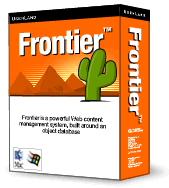Home > Archive > 2009 > December > 30
New core Frontier feature: S3 Prefs
Wednesday, December 30, 2009 by Dave Winer.
 I hit the same wall I always hit when looking for a place to store the users' content.
I hit the same wall I always hit when looking for a place to store the users' content. ![]()
It's not much of a problem when you're running the server for them, but when the server is running on their desktop, as it is in River2, where do you put the publicly accessible content? I could operate a storage system for them, but what happens if the service doesn't take off and never becomes a business? At some point I have to punt, and that leaves users with data that goes missing. Thinking long-term I don't want to set another one of these up. ![]()
The right answer is to help them get their own storage working. And Amazon has made that relatively easy, so I spent the time to make it really work. ![]()
The users' feeds are stored in Amazon S3. For this I need three pieces of data. The "Access Key ID" (which is the equiv of a username), "Secret Access Key" (password) and a default bucket. That's explained on the Frontier News site. ![]()
Frontier News: New preferences for Amazon S3. ![]()
I created my own feed using the new tool, you can see it's on Amazon. I wouldn't subscribe to it, while it should keep updating, I'm going to merge it with my lifeliner feed. ![]()
Recent stories
 Dave Winer, 54, pioneered the development of weblogs, syndication (RSS), podcasting, outlining, and web content management software; former contributing editor at Wired Magazine, research fellow at Harvard Law School, entrepreneur, and investor in web media companies. A native New Yorker, he received a Master's in Computer Science from the University of Wisconsin, a Bachelor's in Mathematics from Tulane University and currently lives in Berkeley, California.
Dave Winer, 54, pioneered the development of weblogs, syndication (RSS), podcasting, outlining, and web content management software; former contributing editor at Wired Magazine, research fellow at Harvard Law School, entrepreneur, and investor in web media companies. A native New Yorker, he received a Master's in Computer Science from the University of Wisconsin, a Bachelor's in Mathematics from Tulane University and currently lives in Berkeley, California.
"The protoblogger." - NY Times.
"The father of modern-day content distribution." - PC World.
One of BusinessWeek's 25 Most Influential People on the Web.
"Helped popularize blogging, podcasting and RSS." - Time.
"The father of blogging and RSS." - BBC.
"RSS was born in 1997 out of the confluence of Dave Winer's 'Really Simple Syndication' technology, used to push out blog updates, and Netscape's 'Rich Site Summary', which allowed users to create custom Netscape home pages with regularly updated data flows." - Tim O'Reilly.
Dave Winer
© Copyright 1994-2009 Dave Winer
Last update: 12/30/2009; 7:18:47 PM Pacific. "It's even worse than it appears."